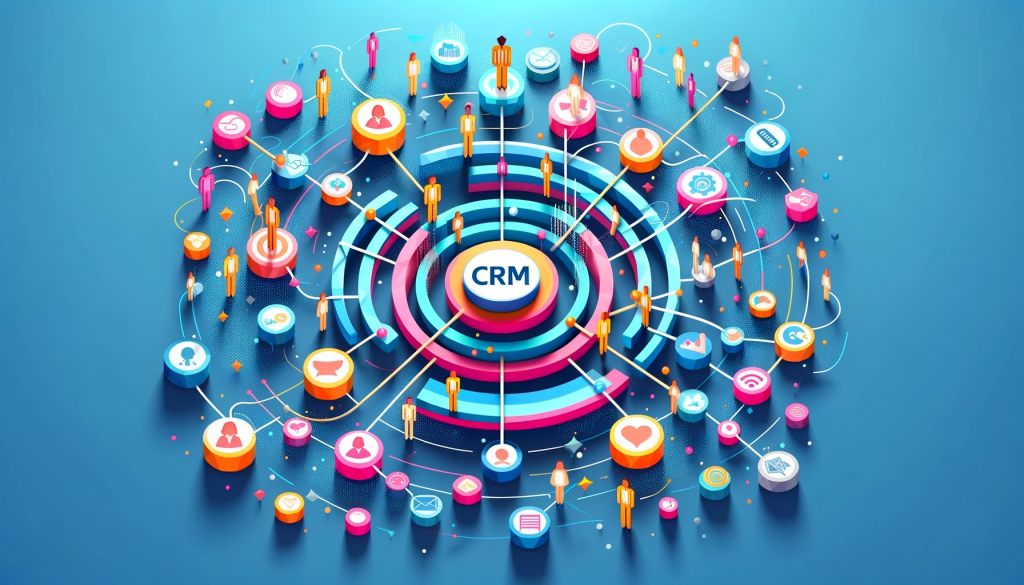The correlation between CRM systems and marketing is crucial in today’s data-driven environment. These systems play a vital role in gathering insights on customer preferences, facilitating targeted campaigns, and increasing engagement.
Our guide will navigate through the importance of CRM in marketing by showcasing how it enhances personalization, streamlines campaign processes, and provides strategic insights to fuel your overall marketing strategy.
Key Takeaways
- CRM systems are integral in marketing, serving to manage customer data, personalize interactions, aid in customer segmentation, optimize marketing campaigns, and ultimately boost customer engagement, satisfaction, and loyalty.
- Key features of CRM, such as lead scoring, marketing automation, and analytics, empower marketers to prioritize high-potential leads, streamline repetitive tasks, and gain insights from campaign performance for data-driven improvements.
- Integrating CRM with other marketing tools like email marketing platforms, social media, and e-commerce can enhance marketing strategies, streamline marketing operations, and create a cohesive customer experience across various channels.
The Role of CRM in Marketing

Table of Contents
Every interaction with a customer, whether it be during sales or when addressing their needs through customer service, presents an opportunity to strengthen the relationship and drive continued engagement. CRM systems are crucial in this process as they offer a centralised platform for collecting and analysing valuable customer data.
This enables businesses to gain comprehensive insights into their customers’ demographics and preferences, contributing towards building stronger relationships and enhancing overall engagement throughout the entire lifecycle.
To manage existing customer relationships effectively, CRM systems also aid in identifying potential customers and engaging them strategically. They play a vital role in streamlining interactions with potential clients during the sales process while personalising these engagements according to individual requirements for creating a positive brand image.
By customizing strategies based on specific preferences of each client, this approach driven by CRM can greatly boost satisfaction levels among customers leading to increased loyalty over time.
The personalized approach facilitated by CRMs that is centered around both the various stages of the customer’s journey as well as maximizing their lifetime value holds immense importance in driving up not only satisfaction but also long-term commitment from patrons towards any business entity.
Enhancing Customer Segmentation
CRM is an effective tool for improving customer segmentation in marketing. It utilizes customer data to organize and analyze information, allowing businesses to categorize their audience into meaningful groups. This feature can be found on CRM platforms like Mailchimp, which utilize tags and groups for personalized labeling and segmenting customers based on provided details.
Using Mailchimp’s tag system, contacts can be labeled according to specific traits or purchasing behavior. Meanwhile, the group function generates categories from form field information provided by subscribers.
This enables businesses to send targeted messages that align with expressed preferences of individuals within each group, as well as create tailored campaigns that are more likely to resonate with their target audience, ultimately leading to improved engagement levels and increased loyalty among customers.
Through this approach of segmenting customers using CRM tools such as tagging and grouping features offered by platforms like MailChimp. Organizations are able achieve greater precision when creating focused marketing strategies aimed at particular segments within a larger market pool while simultaneously fostering stronger relationships between themselves & these potential clients resulting in higher rates of satisfaction.
Personalizing Customer Interactions
In today’s world, personalized experiences are highly valued by consumers and it is expected that brands will take the time to understand their needs. In fact, research shows that 71% of customers expect customized interactions from businesses. This is where CRM systems play a crucial role in helping companies personalize customer interactions.
Collaborative CRM systems facilitate collaboration between marketing, sales and customer service teams, which allows them to access comprehensive information about each individual client’s preferences and requirements.
The use of personalization has become an essential aspect in email marketing with around 80% of email marketers customizing content based on specific details such as names or business profiles for better engagement.
By utilizing data to tailor messages and offers according to individual interests, CRMs enhance overall customer experience leading to increased conversion rates along with improved levels of loyalty and spending among customers over time.
Optimizing Marketing Campaigns
Apart from personalization, CRM systems also provide valuable insights into customer behavior and preferences that can be leveraged to improve marketing campaigns. These systems offer various benefits such as monitoring current interactions with customers across multiple channels, collecting extensive data, empowering businesses to implement more strategic marketing efforts, and ultimately increasing sales.
For instance, analytical CRM systems allow organizations to utilize collected data for a deeper understanding of their customers’ behaviors. This information enables them to make necessary adjustments in business processes while gaining insight on how their messages are received by the target audience.
These tools facilitate experimenting with different aspects of the campaign for better results. They also provide comprehensive analysis reports on the performance of each campaign.
By adopting a data-driven approach towards optimizing marketing campaigns through CRM systems like analytical ones, businesses can significantly enhance conversion rates and generate higher revenue.
By utilizing this strategy, companies have access to too many important pieces of information about their target audience’s behavior and preferences which they can use for improving marketing campaigns.
Key CRM Features for Effective Marketing

After discussing the significance of CRM in marketing, let us now explore some essential elements of CRM that contribute to its efficacy. These features include lead scoring, marketing automation and analytics.
An important component of CRM is lead scoring, which allows for prioritizing potential customers based on their likelihood to convert, thereby guiding marketing efforts towards high-value leads. By automating repetitive tasks within the CRM system, marketers have more time to focus on strategic and creative aspects of their campaigns.
Lastly, Customer Relationship Management (CRM) analytics provides valuable insights into campaign performance enabling marketers to make data-driven improvements and adjustments for better results.
Lead Scoring and Prioritization
Lead scoring is a crucial aspect of CRM, helping companies prioritize their leads based on the likelihood of conversion. This process involves assigning numeric values to each lead according to factors such as fit, interest, and behavior in order to rank potential customers.
CRM software provides various tools that allow businesses to assess key criteria and characteristics of leads in order to determine their perceived value and readiness for purchase. By doing so, sales and marketing teams can focus on the most promising prospects, leading to increased efficiency and optimized return on investment (ROI) from marketing efforts.
One effective method used by CRM is lead scoring through evaluating demographic information, behavior patterns, and social media activity among other factors.This enables businesses’ sales and marketing teams alike, to streamline processes while concentrating specifically on prospective clients that carry higher chances or return better outcomes.Therefore increasing results with regards to Return On Investment (ROI).
Marketing Automation
Marketing automation is a crucial aspect of marketing CRM that can significantly improve the effectiveness of marketing efforts. This feature automates time-consuming and repetitive tasks, such as entering lead data and running email campaigns, freeing up more time for marketers to focus on strategic and creative pursuits.
As a result, there is an increase in lead generation and higher returns on investments made towards marketing.
Some examples of tasks that can be automated within CRM include managing leads by automatically moving them from the marketing stage to sales, sending welcome emails to new prospects, and creating personalized campaigns tailored to specific segments or tags assigned by the marketer themselves.
Follow-up messages with potential customers can also be executed through this tool while setting appointment reminders becomes effortless using merge fields for customization purposes.
With these processes being streamlined through CRMs’ automation capabilities, not only does it enhance operational efficiency but also delivers improved results when it comes down to making impactful decisions regarding any campaign strategies involved. All without missing out any useful information directly related to your business goals.
Analytics and Reporting
The inclusion of analytics and reporting features in CRM is crucial as it provides valuable insights into the performance of campaigns. Through the collection and analysis of customer data, patterns and long-term trends can be identified, giving businesses a deeper understanding of their customers’ behavior and overall performance.
These insights are beneficial for organizations when it comes to lead comprehension, prioritizing efforts, and creating personalized marketing strategies. CRM analytics aid in campaign adjustments by segmenting customers based on their characteristics or behaviors.
This allows for tailored campaigns that increase conversion rates while optimizing resource allocation based on data-driven decisions.

Integrating CRM with Other Marketing Tools
Aside from its individual capabilities, CRM can also be integrated with other marketing resources to enhance overall marketing effectiveness. By linking and syncing up CRM with email marketing, social media platforms, and e-commerce channels, businesses can streamline their promotional efforts, maintain consistent customer data throughout the organization, and improve their advertising strategies.
One way of leveraging this integration is by using CRM in conjunction with email marketing tools to conduct targeted campaigns and increase customer engagement. Similarly, syncing up CRM with social media allows for greater interaction opportunities between customers and improved service through valuable insights gathered from these interactions.
Email Marketing Integration
By integrating email marketing with CRM, businesses can take advantage of personalized campaigns and increased customer engagement. Using data from their CRM systems, companies can develop targeted emails that resonate with individual customers for more successful marketing results.
The integration between CRMs and email management allows users to send messages directly through the CRM interface. This makes it easier to update lead status, add comments, prioritize emails and streamline overall communication processes.
Tools like Campaigns by Pipedrive are designed specifically for use within a CRM environment. They offer features such as audience segmentation options, customizable email templates creation tools, content distribution capabilities, and insights on engagement metrics which help improve the effectiveness of your outreach efforts.
Social Media Integration
In the modern age of technology, social media plays a vital role in customer engagement. The integration of CRM with social media can greatly improve marketing strategies by increasing interaction with customers, enhancing customer service and providing valuable insights for marketing purposes.
Through Social CRM, companies are able to gain a comprehensive understanding of their customers and their interactions by combining traditional CRM features with those specifically designed for managing social media presence and sales opportunities.
Popular examples include Salesforce Social Studio and monday.com which offer tools such as monitoring different platforms, engaging directly with clients on these channels, and overseeing all aspects related to using social media within the realm of the overall Customer Relationship Management system.
E-commerce Integration
Integrating e-commerce platforms with CRM can greatly benefit businesses that have an online storefront. By connecting and synchronizing these two systems, companies can effectively manage customer interactions across multiple channels and ensure a seamless shopping experience.
The integration of CRM and e-commerce provides numerous advantages including improved inventory planning, increased efficiency through automation, the ability to segment customers, access to relevant information, centralized management of social media engagement and secure handling of payment data.
By integrating their CRM system with their chosen e-commerce platform, businesses are able to offer personalized shopping experiences for customers, which helps drive more sales by increasing checkout conversions.
This also leads to enhanced customer engagement as they feel valued by receiving tailored recommendations based on previous interactions.

The Roll of AI in CRM Marketing
The emergence of Artificial Intelligence (AI) has brought significant changes to various business sectors, including CRM. Through automating tasks and providing more comprehensive customer insights, AI is revolutionizing CRM marketing.
An example of this can be seen in the use of AI-based sales forecasting tools that improve lead scoring and pipeline management. These advanced tools enable businesses to accurately predict future sales while also offering practical recommendations for their sales teams.
By incorporating AI into their CRM strategies, companies not only streamline routine tasks but also gain deeper understanding of customer behavior which enables them to make well-informed decisions for effective marketing initiatives leading to overall business growth.

CRM Success Stories: Real-Life Examples
Examining real-life success stories of companies that have successfully implemented CRM can provide a better understanding of the impact it has on marketing. These case studies, ranging from small businesses to large corporations, demonstrate how CRM can enhance customer engagement, streamline operations and drive growth.
CRM offers significant benefits for businesses regardless of their size, such as improving customer service, driving sales growth and increasing customer retention through comprehensive analytics. These success stories serve as evidence to the transformative potential of CRM in boosting business growth.
Small Business Success
Effective customer relationship management is crucial for small businesses, but it often comes with unique challenges. To overcome these obstacles and drive growth, many companies turn to CRM systems that automate tasks, improve relationships with customers, and provide valuable insights for decision-making. By implementing the right CRM system, small businesses can effectively manage their interactions with customers and achieve success.
CRM implementation has been proven successful by numerous examples of revenue growth in small businesses such as Keap, EspoCRM GreenRope Efficy, Followup CRM, particularly among existing clients who have benefitted greatly from this approach.
Salesforce and Zoho CRM are well-known tools that illustrate how a robust customer relationship management strategy can result in increased sales, revenue, and overall satisfaction amongst your clientele through optimized processes. Developing effective CRM platforms not only enhances managing customer relationships, but also contributes significantly towards improving business performance for smaller entities.
Enterprise Success
CRM has the potential to offer significant advantages for large enterprises, including managing vast amounts of customer data and promoting collaboration across different departments. By consolidating all essential information in one place, CRM can improve efficiency and handle growing volumes of data and interactions. This ultimately leads to improved service quality and increased sales opportunities.
The effectiveness of implementing a CRM system is demonstrated by numerous successful case studies from prominent companies like Amazon, Apple, British Airways, McDonald’s, and Kimberly. These businesses have effectively utilized scalable CRM systems to streamline their operations and reap tangible benefits such as enhanced productivity and better performance. Such examples highlight how organizations of varying sizes can leverage the power of CRM systems for sustainable growth.
Selecting the Right CRM for Your Marketing Needs
While CRM offers significant advantages for businesses, selecting the appropriate one to meet your marketing needs can be complex. This task involves evaluating business requirements, comparing various CRM solutions and ensuring a smooth implementation process.
Prior to investing in a CRM system, it is important for a company to have clearly defined objectives, support from executives, an assigned project leader and budget allocation. When considering different CRM options, features such as segmentation capabilities that enable personalized marketing campaigns should be taken into account along with efficient management of marketing efforts.
Assessing Business Requirements
The initial step in choosing the right CRM solution is to assess the specific needs of your business. This entails clarifying objectives, understanding user requirements, and determining necessary features for an effective CRM system.
To determine what users need, companies can utilize customer surveys for obtaining feedback, employ analytical tools within their existing CRM systems to gain insight into customer behaviors or gather information through social media platforms.
When selecting a suitable CRM system, important factors include data security measures and storage options as well as organizational capabilities relating to sales tracking. The ability to track communication with customers also remains an essential criteria when considering potential crm solutions.
Comparing CRM Solutions
Once you have identified your business needs, the next step is to compare different CRM solutions. The perfect CRM solution should align with your business goals, fit within your budget and provide all the necessary features.
When evaluating various CRM software options, consider factors such as its ability to integrate with existing tools, the range of functions available and if it meets the efficiency requirements of your team. Since costs can vary greatly for crm systems, it is crucial to select a solution that offers maximum value for your investment.
Testing and Implementation
The final stage of selecting the appropriate CRM for your marketing requirements involves testing and putting it into action. This entails ensuring that the CRM software is fully functional, aligned with business goals, and accepted by users.
Before fully implementing a new CRM platform, it’s recommended to conduct thorough testing to verify its functionality and alignment with business objectives. After implementation, you can expect technical support features such as case management.
Phone integration, knowledge management, self-service options, ticketing system, live chat, self-service portal, social media integration, and multilingual support from your chosen provider of CRMs.
Summary
To sum up, the use of CRM is crucial in improving marketing initiatives through its ability to centralise customer data management and analysis, facilitate personalized interactions with customers, optimize campaigns and integrate with other essential marketing tools. By leveraging CRM’s capabilities effectively, businesses can achieve higher levels of customer engagement along with increased operational efficiency resulting in improved sales revenue.
Although selecting a suitable CRM for specific marketing needs may seem daunting at first glance, careful evaluation of business requirements coupled with thorough comparison among different available solutions followed by proper testing and implementation can help companies reap maximum benefits from their chosen tool. It is time to take advantage of all that CRMs have to offer as we strive towards taking our overall market strategies further!
Frequently Asked Questions
What is a CRM for marketing?
CRM for marketing encompasses the techniques, methods, and tools utilized to oversee and evaluate customer engagements across the entire customer journey with a goal of enhancing retention rates and boosting sales. It focuses on nurturing strong connections with customers through effective management of their interactions throughout various stages in their buying process.
What is CRM in e marketing?
In e-marketing, CRM refers to customer relationship management, which involves the use of various digital tools to manage and maintain strong relationships with customers. These tools are utilized throughout a customer’s lifecycle in order to enhance their overall experience, increase brand loyalty, and generate potential leads. The main goal is to improve customer service, retention rates and ultimately drive sales growth by carefully tracking interactions with clients while also personalizing their experiences.
What are the key features of CRM for effective marketing?
Effective marketing with CRM relies on lead scoring, automation tools, and analytics to effectively target and engage potential customers. These features play a crucial role in identifying valuable leads and streamlining the marketing process for maximum impact on potential customers.
How can CRM be integrated with other marketing tools?
Incorporating CRM into email marketing, as well as social media and e-commerce platforms, can boost the overall effectiveness of a company’s marketing efforts. This integration has the potential to streamline tasks and enhance customer targeting strategies for better results.
How do I select the right CRM for my marketing needs?
In order to choose the most suitable CRM for your marketing needs, it is important to evaluate your company’s specific requirements. This includes thoroughly comparing various CRM solutions available in the market. Ensuring a seamless implementation process is crucial for successful integration of the chosen solution.
